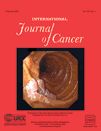Food groups and renal cell carcinoma: A case–control study from Italy
Abstract
Although nutrition and diet have been related to renal cell carcinoma (RCC), the role of specific foods or nutrients on this cancer is still controversial. We evaluated the relation between a wide range of foods and the risk of RCC in an Italian case–control study including 767 patients (494 men and 273 women) younger than 79 years with incident, histologically confirmed RCC, and 1,534 controls (988 men and 546 women) admitted to the same hospitals as cases for a wide spectrum of acute, non-neoplastic conditions, not related to long term diet modifications. A validated and reproducible food frequency questionnaire, including 78 foods and beverages, plus a separate section on alcohol drinking, was used to assess patients' dietary habits 2 years before diagnosis or hospital admission. Multivariate odds ratios (OR) were obtained after allowance for energy intake and other major confounding factors. A significant direct trend in risk was found for bread (OR = 1.94 for the highest versus the lowest intake quintile), and a modest excess of risk was observed for pasta and rice (OR = 1.29), and milk and yoghurt (OR = 1.27). Poultry (OR = 0.74), processed meat (OR = 0.64) and vegetables (OR = 0.65) were inversely associated with RCC risk. No relation was found for coffee and tea, soups, eggs, red meat, fish, cheese, pulses, potatoes, fruits, desserts and sugars. The results of this study provide further indications on dietary correlates of RCC, and in particular indicate that a diet rich in refined cereals and poor in vegetables may have an unfavorable role on RCC. © 2006 Wiley-Liss, Inc.




